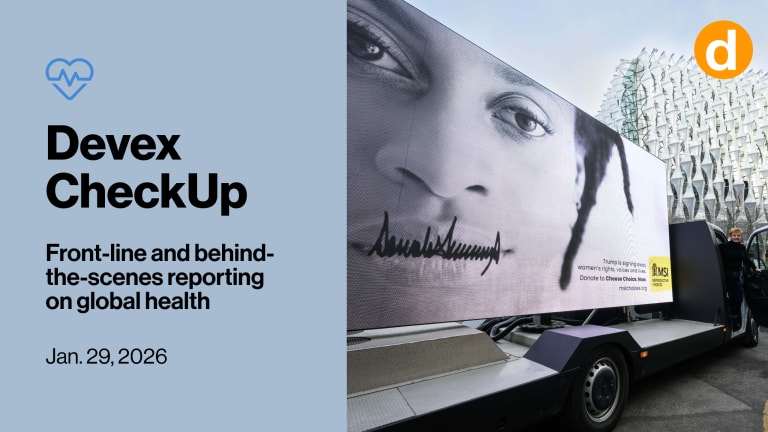CGIAR earmarks cash to squelch 'zombie myths'
Gender-related research has been woefully underfunded, leading to the proliferation of incorrect concepts, ideas and statistics — a situation CGIAR aims to address with its new policy. Curious to know examples of such "zombie myths"? Here's four of them.
In their quest to complete a literature review of research about women and agricultural development, Jacqueline Ashby and Jennifer Twyman found themselves stalked by what seemed to be zombie myths: concepts, ideas and statistics that — no matter how thoroughly debunked — just refused to die. “You can read papers from the 1980s and they don’t look terribly different from the papers that are being written now,” said Ashby, senior adviser on gender and research for CGIAR, an international consortium of agricultural research organizations, in an exclusive interview with Devex in Paris. Nobody can explain zombies. And nobody knows why there’s been so little progress in research on agriculture and gender. “I’m struggling with that issue,” Ashby said. “I think we all are.” To the rescue, at least for starters, is CGIAR’s decision to earmark funds to study gender issues. This move came as result of a 2010 self-examination, which found that gender-related research had been woefully underfunded. “It is now a policy of the consortium board that programs, in order to receive multilateral funding, need to show that they’re making a serious level of investment in gender in agricultural research,” Ashby said. In the past couple of years, CGIAR’s budget for gender research has increased from 2 percent of total outlays to 14 percent. “We’re putting our money where our mouths are,” Ashby noted. Yet most zombie myths remain at large. They’re “stereotypes that do not die,” according to Twyman, science officer for CGIAR’s research program on climate change, agriculture and food security. “You have to get at the underlying causes of gender inequality to break past these things,” Twyman told her audience at the “Closing the Gender Gap in Farming Under Climate Change” conference. The consensus seemed to come down to three factors: power, gender norms and control over resources. Here’s a rundown of Ashby and Twyman’s four leading zombie myths. 1. Women produce 60-80 percent of our food. In developing countries, 79 percent of women report agriculture as their primary economic activity, noted Twyman. “But that doesn’t really tell us how much women contribute to output,” she said. If you factor in men, women only make up 42 percent of the economically active population for agriculture globally. Studies have found outputs by female-headed households to range from 2 percent in China to 17 percent in Nicaragua. But most women live in male-headed households. Look at plots owned and managed by women, and figures are similarly inconclusive. “That 60-80 percent is a zombie statistic, but there’s some truth behind it,” Twyman said. “Women do contribute a lot to agricultural production.” Case studies show that as much as 60 percent of agricultural labor can be contributed by women. 2. Women are more vulnerable to climate change because they are more likely to be poor. “I don’t know how many times I have read this at the beginning of a paper,” Twyman said. The assumption is that the poor are the most vulnerable to climate change, and that women make up 70 percent of the world’s poor. “This is another zombie statistic,” she said. “There’s not much evidence to support the affirmation that 70 percent of the world’s poor are women. And there’s a stereotype there that women are vulnerable. More vulnerable than men, though that’s not stated, but it is kind of implied. This portrays women as victims.” The underlying inequalities should instead be examined, she suggested. “Men and women have different vulnerabilities to climate change, and these are dependent on gender norms: the gender division of labor, access and control over resources and decision-making power,” Twyman explained. 3. Women make better stewards of natural resources than men. “This crops up fairly frequently in the preambles of policy documents,” Ashby told conference participants. Yet the research results are contradictory. “Why? Because ‘women,’ in quotes, do not have a single unified interest. Women’s interests in the stewardship of natural resources are shaped just as much by social class, wealth and power as are the interests of men. This seems like a very simple point, but it is a hard one to get across.” Ashby added that “the other aspect of this is about participation: [the assumption is that] if we have women involved, they’ll be more likely to succeed. Again, there is no consistent evidence that supports this claim.” 4. New technology can close the gender gap. “There are a lot of economic studies that show that the gender productivity gap can be effectively eliminated so long as we make sure that there’s equal access to technologies and inputs,” said Ashby, adding that this often extends to the promotion of “women-friendly technologies.” These might address specific issues like firewood collection, but “don’t deal with the underlying social problems or what are called the ‘strategic needs.’” In one high-profile case study, new technology was introduced and women’s labor increased, but the men remained in control of crop choices and sales. “So women were working harder to produce income over which they had very little control,” she said. From myths to reality There are more myths where those come from. “I couldn’t tell you how many there are,” Ashby told Devex. “There are certainly more than four.” Perhaps nobody can explain why the research screen seems to be frozen, but Ashby has a theory. “My personal perception is that it’s a reflection of underinvestment and low prestige,” she said. Resorting to irony, she added: “Women are not really serious farmers, and people who do research on women farmers are not really serious researchers.” Know of other zombie myths? Let us know by leaving a comment below. Read more international development news online, and subscribe to The Development Newswire to receive the latest from the world’s leading donors and decision-makers — emailed to you FREE every business day.
In their quest to complete a literature review of research about women and agricultural development, Jacqueline Ashby and Jennifer Twyman found themselves stalked by what seemed to be zombie myths: concepts, ideas and statistics that — no matter how thoroughly debunked — just refused to die.
“You can read papers from the 1980s and they don’t look terribly different from the papers that are being written now,” said Ashby, senior adviser on gender and research for CGIAR, an international consortium of agricultural research organizations, in an exclusive interview with Devex in Paris.
Nobody can explain zombies. And nobody knows why there’s been so little progress in research on agriculture and gender.
This article is free to read - just register or sign in
Access news, newsletters, events and more.
Join usSign inPrinting articles to share with others is a breach of our terms and conditions and copyright policy. Please use the sharing options on the left side of the article. Devex Pro members may share up to 10 articles per month using the Pro share tool ( ).
Bill Hinchberger is a global communications professional and educator. He studied at Berkeley and has taught at the Sorbonne. Based mostly in Paris, he spends quality time in Brazil and the United States, and works extensively in Africa and Latin America. He has served as an international correspondent for The Financial Times, Business Week, ARTnews, Variety, and others. One current focus of his work is content creation for foundations, NGOs and other organizations, especially those working on issues related to international affairs, the environment and development. He also runs training programs for professional journalists, notably in Africa, and is an associate of Rain Barrel Communications, a leading consultancy for social justice projects.








